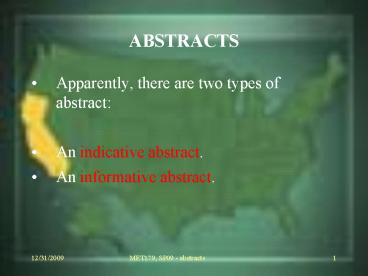ABSTRACTS PowerPoint PPT Presentation
Title: ABSTRACTS
1
ABSTRACTS
- Apparently, there are two types of abstract
- An indicative abstract.
- An informative abstract.
2
- An indicative abstract
- Tells what you ARE GOING TO DO and HOW YOU WILL
DO IT (my paraphrase). - It does NOT give results!
3
- An informative abstract
- Tells the same information and DOES give results.
- When would one use either?
4
- An indicative abstract is often used in the
scientific community when submitting an abstract
for a conference or a workshop. - In this case, many of us know we want to attend
and present at a meeting, but the research may
not be complete (so we dont have any results
yet!)
5
- Example
- Intrinsic Variability in Dust Deflation Potential
in Multi-Annual MGCM Simulations. A.F.C. Bridger
(Meteorology Dept., San Jose State Univ.) R.M.
Haberle (NASA Ames Research Center) - Multi-annual simulations with the NASA Ames Mars
General Circulation Model (MGCM) show significant
year-to-year variability in various atmospheric
measures. Bla bla bla. - We will discuss deflation results from
multi-annual simulations. We will focus on the
following questions (a) How large is the
year-to-year variability in deflation both at
specific locations (e.g., Hellas), and globally?
(b) Is the year-to-year variability confined to
certain locations and seasons? (c) What are the
possible impacts of this instrinsic variability
in dust deflation when trying to account for
year-to-year variations in Global Dust Storm
(GDS) activity?
6
- An informative abstract is the type used at the
start of a thesis, proposal, technical report
etc. - It is a high-level summary of the report.
- It covers very briefly
- What you did.
- How you did it.
- What results you got.
- The significance of your work.
- This is what YOU NEED TO DO for your senior
thesis.
7
- Dos and donts about the informative abstract.
- Do write it carefully!
- You write your title carefully to catch the
attention of the reader. - The abstract allows you to include a little more
information and detail beyond the title. - Your goal is to get the reader to read your paper
(and bring fame, fortune, more grants, prestige
etc. to you and/or your company!)
8
- Do think about keywords and phrases to include.
- These will be picked up by Google etc!
- Exampledont write an abstract about El Nino
without the words El Nino in the abstract!
9
- Do include
- An introduction why you did this study.
- A methods section how you did this study.
- A results section your main result(s).
- A conclusion why this is so important
- See examples in a minute.
10
- Do make it available to a wide audience (while
being technically sound). - Abstracts are now widely available because of the
internet. Make sure yours can be read (i.e.,
understood, i.e., jargon-free) by many! - Do pay attention to length guidelines.
- SJSU guidelines for an MS thesis are 150 words
maximum!!!
11
- Dos and donts about the informative abstract.
- Do not
- Use jargon
- Acronyms?
- Speak in the future tense!
- We are going to (future tense) analyze data to
show that rainfall in Reno, NV will be extinct in
50 years. - Using analysis of rainfall data over the past 50
years, together with regional WRF simulations, we
show (present tense) that rainfall in Reno, NV
will fall to below four inches per year in the
next 50 years.

